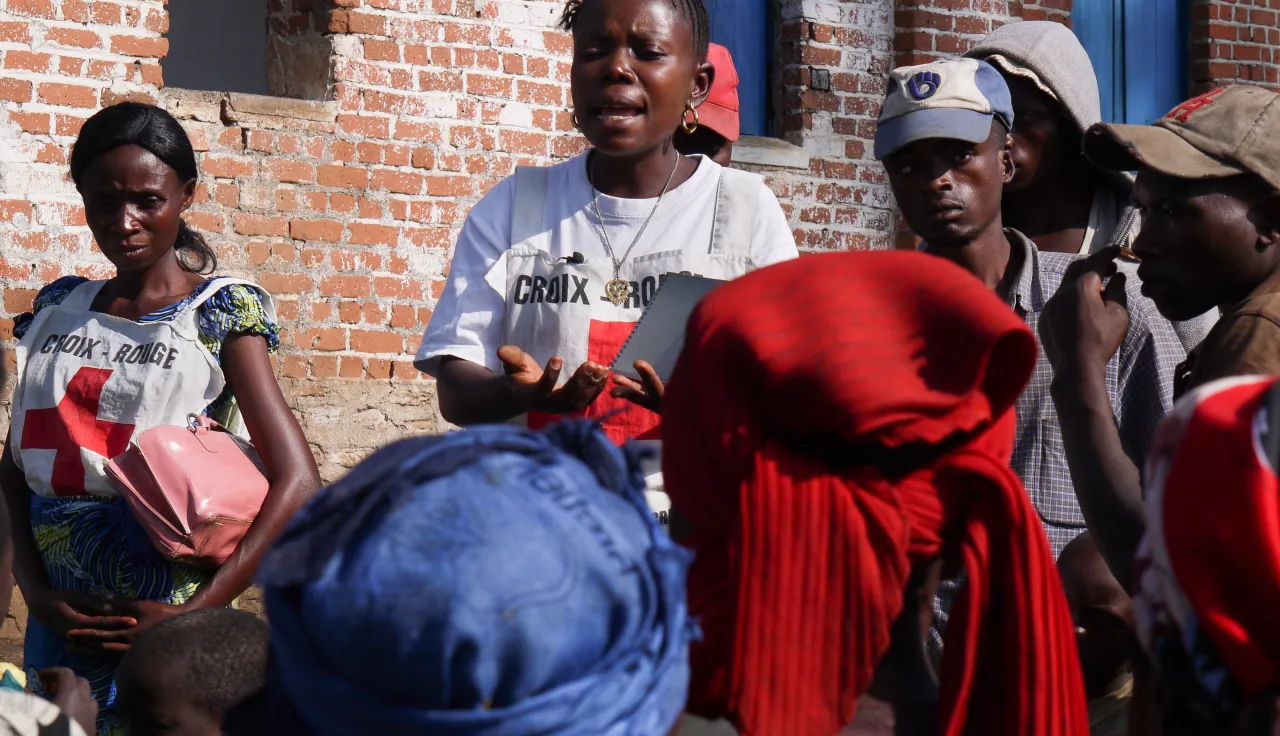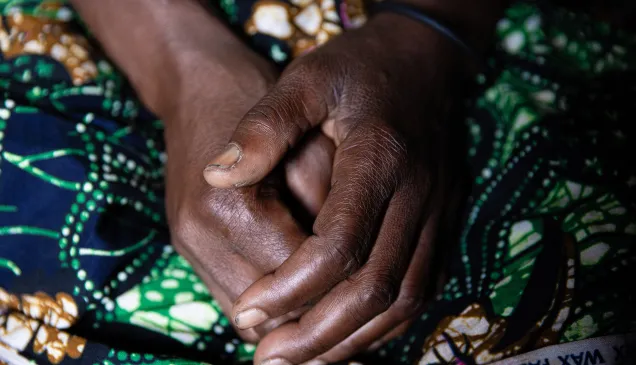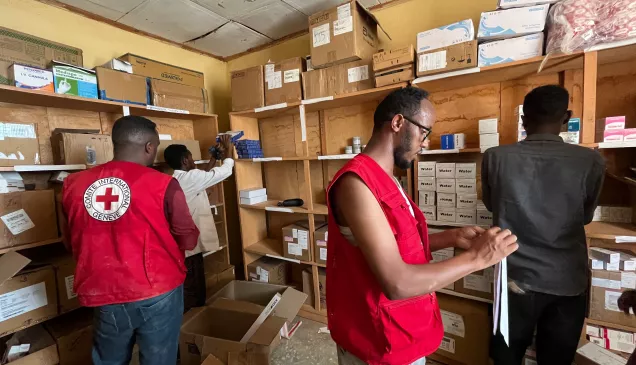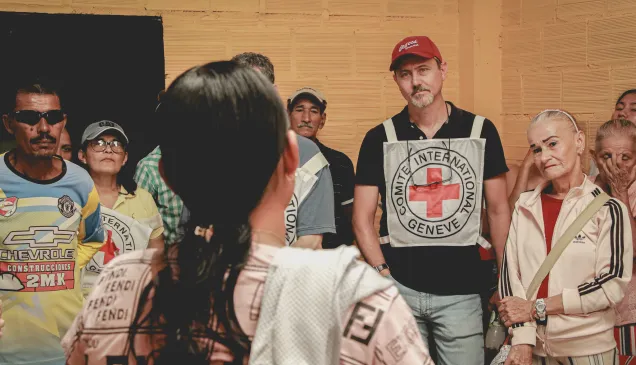“The primary responsibility for tackling sexual violence rests with the authorities”

Preventing sexual violence and looking after those who have suffered from it are the two main ways that the ICRC acts in this sensitive area. Although we are making headway, the task is still enormous.
We talked to Fanny Buttigieg, an ICRC mental and psychosocial health delegate in the Democratic Republic of the Congo (DRC), to find out more.
1. How big a problem is sexual violence in the country at the moment?
We're all aware that sexual violence is widespread in the country because of the various prolonged and recurring conflicts. All of the areas in which fighting is taking place are affected. The fact that, in 2017, weapon bearers were behind 85 per cent of the incidences of sexual violence that we recorded in South Kivu Province is no surprise, given the significant presence of armed opposition groups and regular armed forces there.
We believe that victims can come up against this type of violence at any time – on the way to the market, out in the fields or even at home – and that the horror of the experience can be exacerbated by, for example, the fact that it is witnessed by their children, that the husband is taken away or executed, or that they themselves are tortured or mutilated. That happens regularly.
To top it all, the victim is often ostracized by her community, and sometimes even cast out by her own family. Thankfully, those closest to the victim do sometimes rally round her, but that's not always the case. Something else to bear in mind is access to care, which is difficult in most areas. The nearest health post can be many kilometres away, lacking in the right equipment and medicines and staffed by people who are unaware of the issue or poorly trained.
2. What problems do the victims of sexual violence suffer from?
First of all, there are the physical consequences, such as the possibility of contracting a disease like HIV, becoming pregnant or being left permanently disabled. As for the psychological consequences, these can include insomnia, depression, constant fear and extremely low self-esteem.
Quite apart from these serious individual problems, sexual violence is an issue that affects whole communities. I'm talking in particular about the risk of contracting sexually transmitted diseases if they're not treated in time, but also about the breakdown of social cohesion due to stigmatization and rejection of the victim by her family or the community, which can compound victims' sense of isolation and suffering.
All of these difficulties make it harder for victims of sexual violence to recover and get back into normal social and economic life.
3. What can be done to combat or at least mitigate this problem?
The primary responsibility in this domain rests with the authorities – all authorities, be they civilian, military or political. The State and its representatives have a duty to protect citizens and ensure their security, their psychological well-being and their physical safety. It's a mammoth task. As for the ICRC, we're there on the ground, working equally hard to care for the victims and to raise officials' awareness of the problem. We are doing our utmost to prevent acts of sexual violence from being committed and to alleviating the suffering of the victims – women, men, girls and boys.
Our field teams meet regularly with weapon bearers and their commanding officers. In the DRC, as elsewhere, we try to establish a dialogue around respect for the civilian population. This is what we refer to as our protection work. We raise awareness among weapon bearers of what international humanitarian law says or even local customs stand for and what they prohibit in the context of maintaining order or carrying out military operations. When we know that sexual violence has been committed and we have an idea by whom, we refer the matter to the relevant commanding officers to put a stop to the abuse. Because we do not wish to compromise our access to all victims, this dialogue is completely confidential.
We also communicate with the general population and community leaders, with the aim of creating an environment in which the victims can better recover, both physically and psychologically. Changing people's mindset takes time but, to us, this work is crucial.

Minova, South Kivu. An ICRC delegate explains the principles of protecting civilians during an awareness-raising session for members of the DRC's armed forces. CC BY-NC-ND / ICRC / Didier Revol
4. Do victims of sexual violence require specific care?
After a sexually violent act has been committed, the key thing is to act quickly. It is vital that victims attend a health centre within 72 hours to get the care they need, and to minimize the risk of contracting a sexually transmitted disease or having an unwanted pregnancy. After 72 hours, the risk of pregnancy or contracting HIV increases sharply.
In terms of psychological support, we assist a number of community associations that manage what are known as maisons d'écoutes, or counselling centres. Victims of all types of violence, including sexual, can attend these and confide in a psychosocial agent in complete confidence, free of charge. These agents provide psychological and psychosocial care and, if necessary, refer the victims to the nearest health centre. The sooner psychological care is received after the traumatic event, the sooner the victim is likely to recover.
In South Kivu, we support 12 counselling centres and a whole network of agents and liaison officers, who act as a link between the communities, the village leaders and the health services. Thanks to their efforts, people are beginning to have a better understanding of the problem of sexual violence. The counselling centres are supervised by a team of ICRC psychologists, who provide ongoing technical support.
In 2017, the counselling centres looked after 2,175 victims of violence and carried out almost 3,000 awareness-raising sessions in the various communities. Of those who presented at the centres, 88 per cent were women or girls; and 54 per cent of victims of sexual violence visited a centre within 72 hours, meaning timely medical referral was possible.
Not all victims seek help, however, and, unfortunately, we cannot reach all those who have suffered violence. The statistics cannot provide an accurate picture of how many people need our help. Nevertheless, we know that our work in the country is absolutely vital.

South Kivu province, South Hombo. Women playing theatre. In this sketch, a rape victim is being comforted by her family. CC BY-NC-ND / ICRC / Pedram Yazdi



